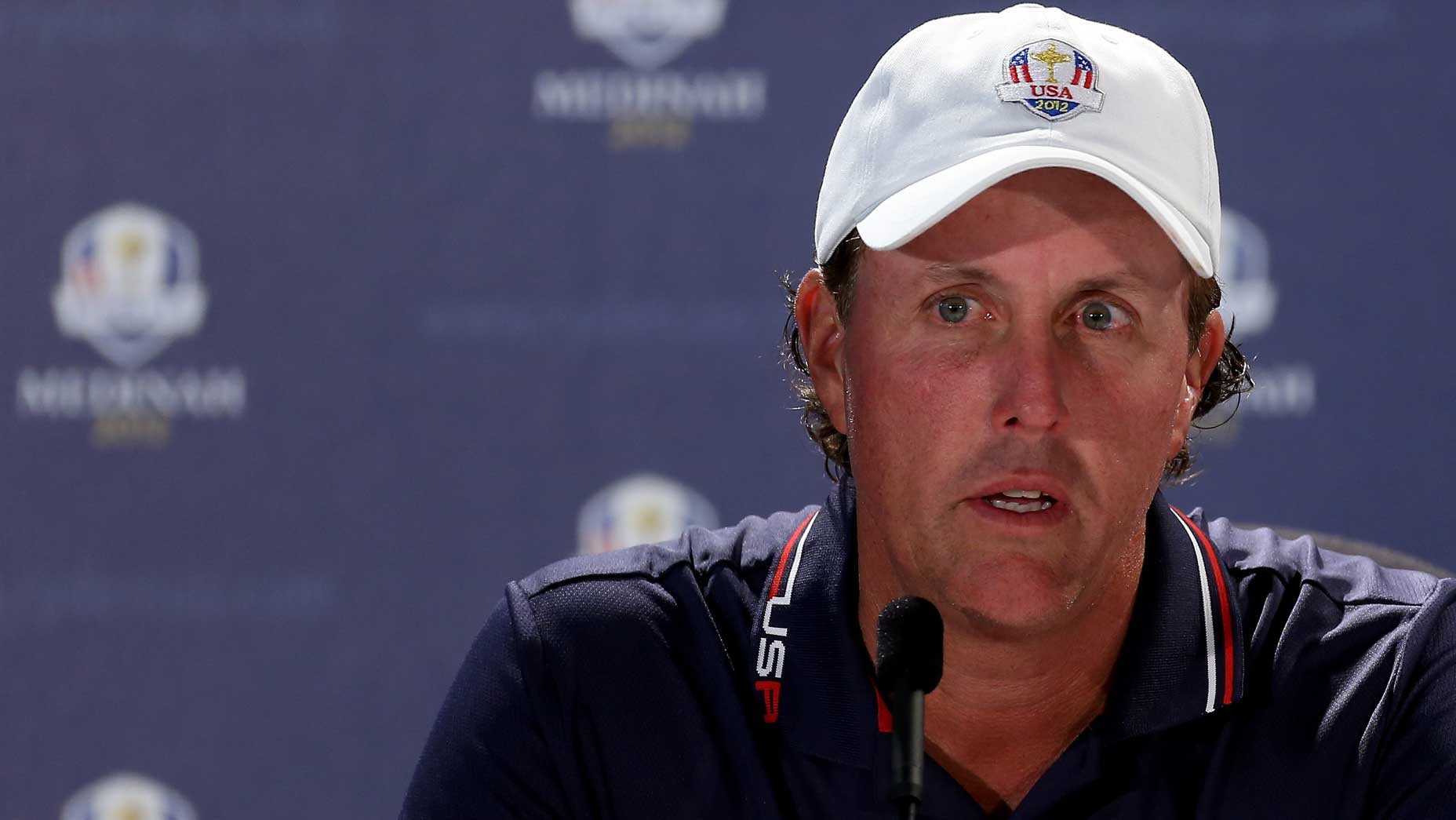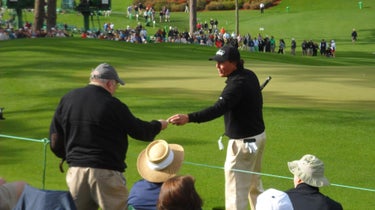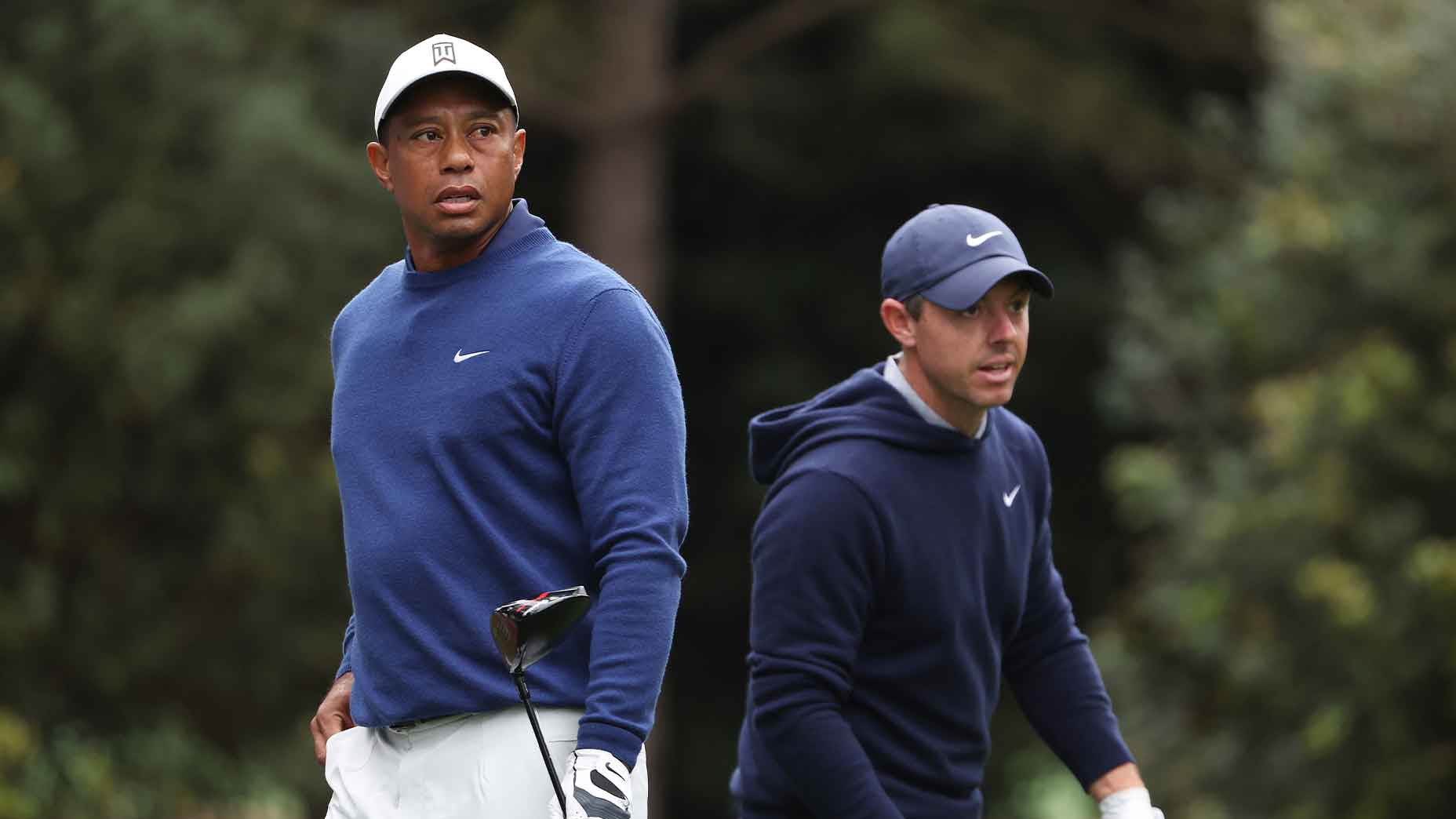
Phil Mickelson at Medinah ahead of the 2012 Ryder Cup.
Getty Images
It’s not news that Phil Mickelson liked to gamble. It’s also not news that his betting led to staggering losses. Those losses had been previously reported in the neighborhood of $40 million.
But a former Mickelson associate alleges that was a lowball number.
Like, really low.
According to a new account by a former gambling partner of Mickelson’s, the golfer’s losses amounted to closer to $100 million, the nine-figure downside to a destructive habit that saw Mickelson wager more than $1 billion over the past 30 years.
And the damage would have been worse, the same account alleges, had Mickelson not been talked out of placing what would have been a losing bet on his own team in the 2012 Ryder Cup.
These and other explosive revelations come courtesy of “Gambler: Secrets from a Life at Risk,” (Simon & Schuster) a forthcoming book by the businessman and sports-betting colossus Billy Walters, an excerpt of which was first published Tuesday by the Fire Pit Collective.
The excerpt, which details what Walters, 76, describes as a five-year “gambling partnership” he forged with Mickelson, also touches on the federal insider-trading investigation in which both men were implicated and which ended with Walters doing prison time.
Mickelson, who has acknowledged in the past that his gambling became “reckless and embarrassing,” was at Trump National Golf Club, in Bedminster, N.J., Thursday morning, taking part in a pro-am in advance of this week’s LIV event. Mickelson’s manager, Peter Davis, said that Mickelson would not be speaking with the media. Davis did not respond to an email from GOLF.com requesting comment.
The excerpt from “Gambler,” which hits bookstores Aug. 23, provides the first glimpse into a much-anticipated autobiography by a man widely recognized as the GOAT of sports betting, a shrewd wheeler-and-dealer whose wagers were long said to have the power to shift betting markets.
Walters also is a longtime golfer.
According to his account, he and Mickelson first met in 2006 at the AT&T Pebble Beach Pro-Am, where Walters and his pro partner, Fredrik Jacobson, made the cut and were paired over the weekend with Mickelson and his amateur teammate.
“Throughout the final round, Phil and I talked nothing but sports, oblivious to the beguiling beauty of the Monterey Peninsula and one of my favorite courses in the world,” Walters writes. “It was evident that he knew of my sports-gambling success and was trying to connect on that level.”
Walters, for his part, was struck by Mickelson’s “brilliance as a golfer” as well as by his willingness to take risks.
“A man after my own heart!” Walters writes.
The next time they crossed paths, in a pro-am at the 2008 Wachovia Championship, in Charlotte, N.C., Walters says that Mickelson was blunter about his interests and broached the topic of a gambling partnership.
Walters was no stranger to such arrangements, but he says he told Mickelson that he only entered them if they allowed him to place wagers with accounts that he didn’t really have access to, and at sums greater than the limits most bookmakers placed on him.
Mickelson checked both those boxes.
“In all the decades I’ve worked with partners and beards, Phil had accounts as large as anyone I’d seen,” Walters writes. “You don’t get those types of accounts without betting millions of dollars.”
Walters says their deal was verbal, and that it called for them to “split everything, fifty-fifty.” During their five-year run, Walters says that he and Mickelson also played “a few dozen rounds together,” always with money on the line but never at big stakes by their standards. The bets were “usually $10,000.”
They saved the big wagers for offshore accounts.
According to Walters, Mickelson had account limits of $400,000 on both college sports and the NFL, caps that allowed Walters to double his own limits. Walters says that Mickelson also had a “$100,000 limit on college over/under bets with each book, twenty times my maximum.”
Over the first six months, Walters says their partnership “ran like Secretariat.” Having studied Mickelson’s betting patterns, Walters says he learned to emulate them, the better to disguise his own involvement in the wagers. It wasn’t long, though, before the bookies caught on.
“They told Phil the best were far more disciplined than usual, so they knew they weren’t solely his,” Walters writes. “He could resume his betting, they said, but only if it was on his own.”
According to Walters, this prompted Mickelson to activate a dormant account so he could keep their partnership alive.
Throughout much of Mickelson’s Hall of Fame career, his gambling habits were a poorly kept secret that often slipped into the public in the form of tales about his outsized money matches with everyone from fellow Tour pros and financial titans to famed athletes from other sports, including Michael Jordan. But the scale of his sports betting — and his losses — was largely speculation until last year’s publication of “Phil,” an unauthorized biography by Alan Shipnuck, which placed those losses at roughly $40 million.
Walters comes to a far larger tally, based on what he says are his own “detailed betting records” and two other “very reliable sources.”
Between 2010 and 2014, Walters says that a partial picture of Mickelson’s gambling ledger shows that he bet $110,000 to win $100,000 a total of 1,115 times; $220,000 to win $200,000 more than 800 times; and, in a single day in 2011, 43 bets on baseball alone that led to $143,500 in losses.
“In all, he wagered a total of more than $1 billion during the past three decades,” Walters writes.
Exorbitant numbers aside, perhaps the most eye-popping of Walters’ claims stems from a call that he says he received in September 2012 from Medinah Country Club, outside Chicago, host of that year’s Ryder Cup. Walters says that Mickelson was on the other line, keen to place a $400,000 bet on the U.S. team to win.
Walters writes:
“Have you lost your f—ing mind,” I told him. “Don’t you remember what happened to Pete Rose?” The former Cincinnati Reds manager was banned from baseball for betting on his own team. “You’re seen as a modern-day Arnold Palmer,” I added. “You’d risk all that for this? I want to part of it.”
Whether Mickelson wound up placing the bet elsewhere, Walters says he doesn’t know. But it would have been a loser, as the Europeans mounted an epic Sunday singles comeback that included a crucial point won by Justin Rose in his match against none other than Mickelson himself.
Mickelson does not deny that his gambling problems were severe. In a 2022 interview with Sports Illustrated, he acknowledged that betting “has been part of my life ever since I can remember” and that his addiction to it became “reckless” and “embarrassing” about a decade ago. In that same interview, though, Mickelson also said that he’d long been addressing the issue.
“We’re at a place after many years where I feel comfortable with where that is. It isn’t a threat to me or my financial security,” Mickelson told SI.
Gamblers, like fishermen, are notorious for telling distorted stories. In high-rolling sports-betting circles, though, Walters has a reputation for being straight with his gambling tallies.
“Billy doesn’t exaggerate,” says one longtime bettor who knows Walters and now runs numbers for several offshore accounts. “That tends to be true of successful bettors. There’s a relationship between those two points. You’re more likely to be successful if you’re honest about your wins and losses, because it means that you’re not hiding anything from yourself.”
In “Gambler,” though, Walters ranges beyond betting to discuss the 2017 insider-trading case that led to his being sentenced to a five-year-prison term. In the case brought by federal prosecutors, Mickelson was named as a relief defendant, meaning he was not accused of wrongdoing. According to the suit, Mickelson was in gambling debt to Walters and received a stock tip from him that that earned Mickelson nearly $1 million.
Mickelson, who was ordered to pay back that money, did not testify in the trial, a development that Walters says hurt his own legal cause.
Since word of Walters’ autobiography first got out, he wrote, a “number of people in the media, on Twitter and the golf world have suggested that Phil ratted me out on insider trading. That is not what happened. What happened was worse.”
Mickelson, Walters asserts, failed to come clean.
Instead of testifying, “Phil Mickelson, one of the most famous people in the world and a man I once considered a friend, refused to tell a simple truth that he shared with the FBI and could have keep me out of prison. I never told him I had inside information about stocks and he knows it. All Phil had to do was publicly say it. He refused.”
That decision, Walters writes “cost me my freedom, tens of millions of dollars and a heartbreak I still struggling with today. While Walters was behind bars, his daughter committed suicide.
“I still believe I could have saved her if I’d been on the outside.”
If all of the above isn’t bombshell enough, Walters says that more is coming:
“While this excerpt focuses solely on our betting relationship, my book explores how Phil finagled his way out of not one but two cases that ended in criminal convictions. As my book makes clear, Phil is not always the person he seems to be.”









